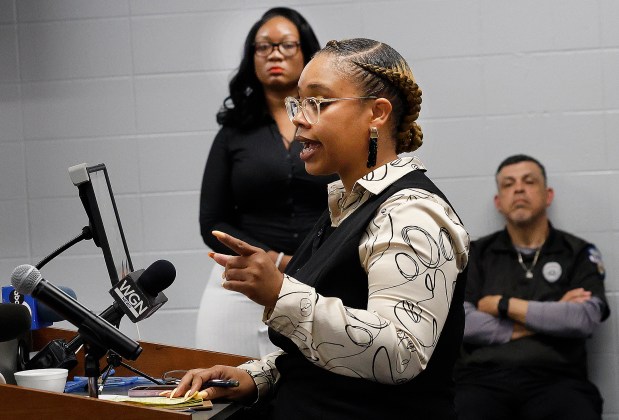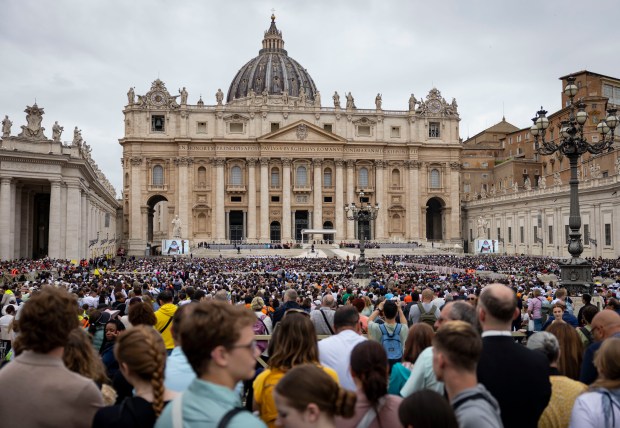Bally’s Chicago revenue was down 7% to about $10.4 million in adjusted gross receipts in April, the first month-over-month revenue decline since the temporary casino opened at Medinah Temple in September.
Admissions were also down, declining more than 4% to 112,751 visitors for the month, according to data released Tuesday by the Illinois Gaming Board.
Bally’s Chicago was not the only casino to see a slowdown in April. Statewide casino revenue was down 10% to about $137 million, according to Gaming Board data. In March, the state’s 15 casinos generated more than $152 million in adjusted gross receipts.
During April, Bally’s Chicago ranked fourth in revenue and second in admissions, with Rivers Casino Des Plaines leading the way in both categories.
But Rivers saw its April revenue decline by nearly 12% to about $42 million, while admissions fell by 7% to 252,239 visitors, according to Gaming Board data.
Despite the downturn, Bally’s Chicago put a positive spin on the results.
“April was our second highest revenue per day and second highest admissions since opening, outpacing the Illinois market, including our major competitors who have more games,” Mark Wong, vice president and general manager of Bally’s Chicago, said in a news release. “We are pleased with the month’s performance and are confident in our trajectory going into the summer.”
Wong touted the expected June arrival of recently approved valet parking and a new VIP Lounge, which is being built in the third floor location originally designated for the still-unopened sportsbook, as catalysts for growth in the coming months.
The tepid April results come amid uncertainty for Rhode Island-based Bally’s, which is continuing to navigate a buyout offer from its largest shareholder and an $800 million funding gap to build its planned $1.7 billion permanent Chicago casino.
In March, New York hedge fund Standard General, which owns 23% of Bally’s, submitted an offer to buy out the rest of the stockholders at $15 per share, valuing the company at about $648 million. The Bally’s board formed a special committee and retained Macquarie Capital as its financial adviser to evaluate the offer and explore strategic alternatives.
Bally’s has not provided any updates on the status of the buyout offer.
In February, Bally’s CFO Marcus Glover told the Nevada Gaming Control Board the company needed to bridge an $800 million funding gap to cover $1.1 billion in remaining costs to build the permanent casino at the Chicago Tribune’s 30-acre River West publishing site.
Last year, Bally’s agreed to pay Tribune Publishing, owners of the Chicago Tribune and other newspapers, $150 million to vacate the Freedom Center by July 5 to break ground on the new casino complex, which is slated to open in September 2026.
During its first quarter earnings call last week, Bally’s President George Papanier said the company is “on track to gain control” of the 43-year-old printing plant in July and “will commence site preparation and demolition shortly thereafter.
“We remain confident that the property will be operational by September 2026, as all timelines are currently on schedule,” Papanier said.
Papanier said the majority of the remaining $1.1 billion in construction costs are expected to be incurred in 2025 and 2026.
Bally’s had $169 million in cash and $3.6 billion in debt at the end of the first quarter, according to its financial reports.
It now owns 16 casinos across 10 states, including the temporary Chicago facility.
Through the first four months of 2024, Bally’s Chicago generated $40.6 million in adjusted gross receipts and more than $4.1 million in local tax revenue, according to Gaming Board data.
With April’s downturn, Bally’s remains far off the pace needed to meet Chicago’s revenue target for its first casino. The city has projected Bally’s to generate $243 million in adjusted gross receipts and $35 million in local gaming taxes this year.
If Bally’s picks up momentum heading into summer, however, the city’s coffers could still see significant upside. The wagering tax is graduated, meaning as the casino’s cumulative annual revenue increases, the overall tax rate goes up, climbing from 15% to as high as 50% on slots, for example.
Bally’s stock price closed down 4 cents to $13.01 per share Tuesday, giving the company a market cap of $527 million.
rchannick@chicagotribune.com




